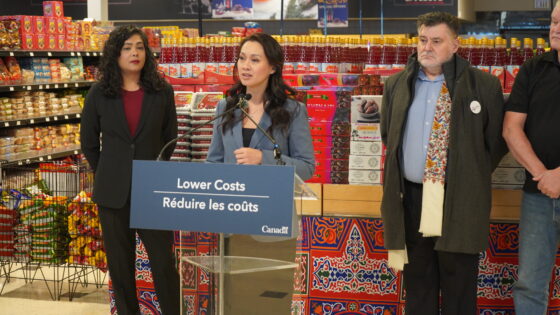on
BY ALYSSA MAHADEO
Every year the holiday season sparks something in us all urging us to give back and even the smallest contributions have the furthest reach.
In 2014,12.6% of households (1 in 8) in the GTA experienced food insecurity according to a report from food policy researchers led by the University of Toronto. In a city abundant with restaurants, it is a startling reality to know that so many of our neighbours cannot afford a healthy and wholesome meal.
Seema David and her children immigrated to Canada from the Middle East in 2007. Her husband joined them in 2008, but their first couple of years were tough getting accustomed to living in a new country, settling the kids at school and searching for a job to provide income for her family. Back in Dubai she had been a school teacher, but after coming to Canada, she had difficulties acquiring the paperwork to get her accreditations here. She obtained a position as a front desk clerk through an agency at the Faculty of Medicine in the University of Toronto offering a bit more than minimum wage and although she worried it wasn’t enough her husband encouraged her to use the position as a method of gaining valuable experience.
She wasn’t there long as an acquaintance at George Brown College got her an interview for the position of Assistant to the Dean. With only background experience as a teacher she worried that she wouldn’t be cut out for the job to complete the admin work required, but after a few interviews she got the position, and the woman she worked for was very accommodating and willing to show her what needed to be done.
Still new to the city in order to get to work Seema used to take the transit system through Toronto. While walking through the city she would see the homeless people on the streets, and working at the college she would hear a lot of talk about charity work. They were very involved in organizing fundraising events for United Way, and this is what first sparked the idea to open up a soup kitchen. Coming from the Middle East she wasn’t familiar with the sight of people living on the streets; in Dubai, you were required to have a visa in order to live there, and so having a job was mandatory.
“I had heard of the term ‘soup kitchen’ but I had never been to one, or had any idea of how it should be run.” Seema recalls. “Based on what I saw, I felt in my heart that I needed to start one especially in my own neighbourhood in Scarborough.”
Seema proposed the idea for a soup kitchen to a few people to see how her idea might be received, and it was met with mixed reactions. People questioned her motives, asking why she wanted to start a soup kitchen as it wasn’t something that she was obligated to do based on her professional background.
She remembered when her family had first come into the country as immigrants, they had brought with them enough savings to invest in a house and get themselves started. For three years after settling here her husband still didn’t have a job, and she was under the pressure of using her low-income admin position as the primary income of the household. Seeing more and more immigrants coming to settle in her neighbourhood, she saw that many of them were struggling even more than she had trying to make a living for themselves in this new country.
Prior to opening the soup kitchen, Seema was advised that this type of operation would cost a lot of money. Of course, they didn’t have the funds to invest in this project, but she promised herself that as soon as God provided the money she would open up a soup kitchen. After a few years had past the idea came to her mind once again. Her family was against the idea, especially since her husband was out of a job again, and she had gone back to the college just to try and keep them afloat. While at the college she focused her attention on doing background and research on how she could get the ball rolling on her soup kitchen, registering a business name, and even opening up a bank account to convince her family that she was serious.
In an effort to open her soup kitchen, Seema approached a local church to ask if they could use their kitchen on the weekends to host people and provide meals for them. Although they turned her down, Seema was resilient, and soon found another kitchen at the East Scarborough Storefront who offered their kitchen for use instead. She acquired another location in addition to the storefront, and went back to the church to show them that the community was responding to her efforts. They offered her the use of their kitchen one day a week and 5n2 Soup Kitchens was put in motion with 150 soups served though these three locations.
Since launching in July of 2013, 5n2 Soup Kitchens has expanded. They now serve from six locations in Scarborough, five days a week! In an urban centre where many are facing challenging situations and are struggling to meet even their basic needs, this initiative has successfully been providing healthy meals for hundreds of marginalized families, children and newcomers each week.
5n2 Soup Kitchens began as a God-given dream in the heart and mind of Seema David. She took her “5 loaves and 2 fish” and took a step on this journey. “Scarborough is my neighbourhood and I want to serve my neighbours,” said Seema. ” When I spoke to people about my vision I began to see that there are many people who have a heart to serve, but simply need a platform to give of their time and resources.”
Thousands need access to at least one healthy meal and 5n2 Soup Kitchens definitely provides an opportunity to do so. Their mission is to provide nourishing soups and meals to our neighbours in need, and their long-term vision is to work towards a hunger-free community where a meal is available for all who need it.
5n2 Soup Kitchens is thankful to all their Community Partners that have helped give this project life including Global Kingdom Ministries, Malvern Presbyterian Church, Salvation Army Immigrant & Refugee Services, Scarborough Centre for Healthy Communities, Second Harvest, St. Stephens Presbyterian Church, Warden Woods Community Centre, Centennial College, George Brown College and The University of Toronto. With every wave of immigration more and more people are in need of their services.
Seema has been thankful for all the volunteers and individuals from the community who have contributed their time and efforts to helping run the soup kitchen, through preparation and serving food, as well as cleaning up and donating ingredients for made from scratch fresh and wholesome meals.
“The money that we have invested in this kitchen as a family ran out in December of last year, but because there are so many people that believe in our vision God has provided us the means to keep all our kitchens in operation.”
Looking toward the future Seema is looking to acquire her own kitchen that will allow them their own space where they can keep items in stock, as well as employ full-time and part-time help as well as acquire Charity status since they are currently operating as a Non-Profit Organization. This holiday season, as well as the year ahead Seema is hoping that more people will send financial donations their way to help them in their mission to provide food for all. To donate and give back visit their website at http://www.5n2foods.com/.
The generous will themselves be blessed, for they share their food with the poor.
[Proverbs 22:9]
Stay in the loop with exclusive news, stories, and insights—delivered straight to your inbox. No fluff, just real content that matters. Sign up today!













